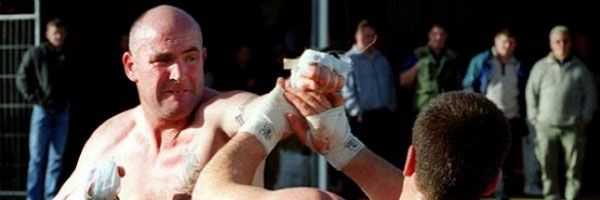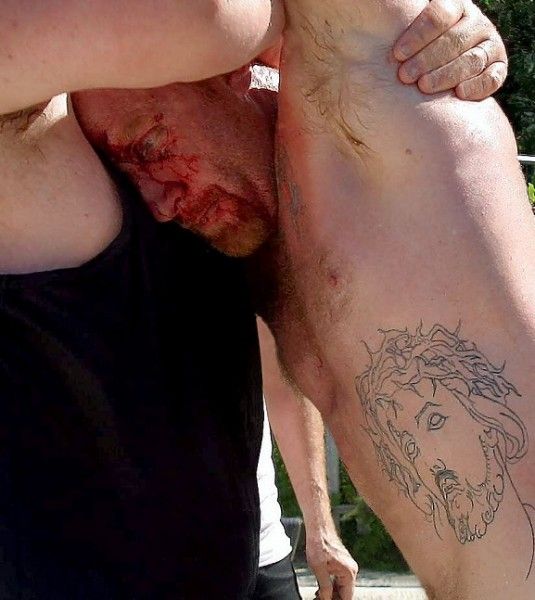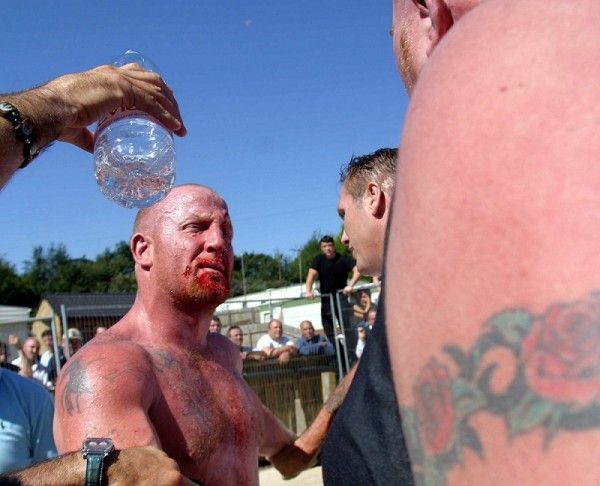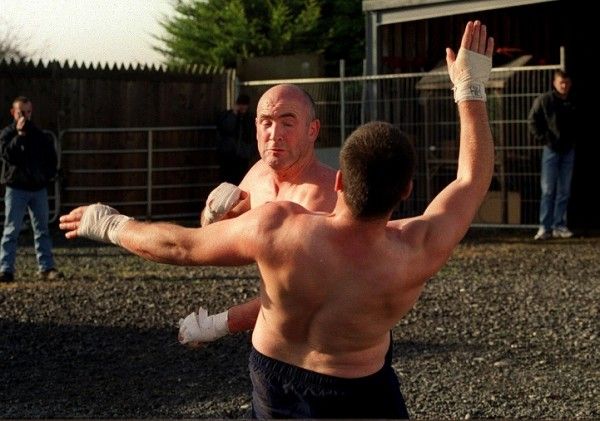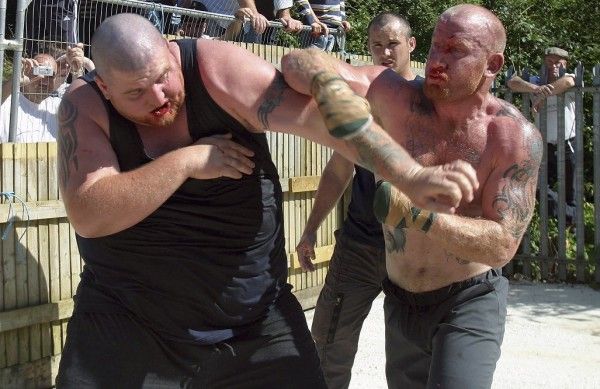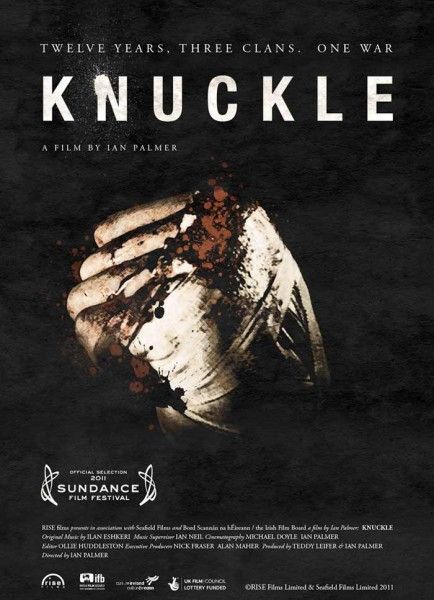Sometimes men fight just to fight. Tempers flare and punches are thrown, and a lot of time the biggest damage is done to egos more than anything else. Filmmaker Ian Palmer found a situation in Ireland where much more damage is done to the bodies and the faces of the fighters that live in a constant sort of conflict with neighboring families. Called Travellers, Gypsies, or any number of things, these nomadic people have long-standing feuds that are settled with individual fights between two representatives of a family in a somewhat civilized stand-up fist fight. Over the course of more than a decade Palmer followed the Quinn McDonaghs and their champion, James, and compiled a documentary simply titled Knuckle, which opens in limited release this weekend and on VOD. Earlier this year I had the chance to sit down with James Quinn McDonagh and Ian, and after the jump you can read the entire interview about this compelling, troubling, and challenging film.
Collider: This film is very much set in Ireland. Very much set across the ocean. You're coming a long way to promote this film. I'm curious how your family has reacted to this. It seems to me that your family is very close but they would be wary of all of this attention. What has their reaction been?
James Quinn McDonagh: They're very aware of what I say and do. Because of Knuckle, and they've all seen Knuckle, and because of the way Ian has done it and we trusted Ian, they trust me to go out and speak, give interviews and talk like this to try and portray our family as good as possible. In that sense I don't tend to provoke the feuds any further and I don't bad-mouth the Evans and Joyces. Just keep things nice and clean and enjoy myself out here.
Are you enjoying this experience?
McDonagh: I'm enjoying it. It's a trip of a lifetime, Knuckle itself. Traveling with Knuckle and traveling with Ian is a trip of a lifetime in general. To get to the States over here. To get to Austin, Texas, New York and LA, it's a dream come true for me. From where I've come from at the beginning of Knuckle to the end of Knuckle, to me it's one of my dreams.
Do you sit around when they screen the film?
McDonagh: I do, and I'll tell you why. I like sitting in with the fans and developed filmgoers. I feel like it's nice and polite to be there among them to get their reactions because there's a lot in there where you'll tilt your head and hear them clap, laugh, and hear their comments. I like hearing all that. I like them to see me there that I'm showing interest in them. It's nice to be there for them. At the end of the day they're paying money to watch the film and I'm not a star person or a celebrity. Nothing like that. So I like to be among the people... I wouldn't call them fans.
The audience.
McDonagh: The audience and to just let them know that I'm enjoying the film as much as they are.
Ian Palmer: Especially if they're pretty girls.
McDonagh: Especially that, yea yea yea.
For Ian, you were filming this in spurts. Over a decade...
Palmer: Yea, a decade or more.
When you were watching this finished product, and you're watching your final cut of it, were there moments when you say to yourself, 'Damn, I wish I would have put that one part there. I had something great'? It sounds like you would have a ton of footage.
Palmer: Yea, I had a ton of footage that I shot myself or my crew shot with me. I also had a ton of stuff from the various families giving me footage. Whether it was wedding footage they had themselves; back story stuff. Very difficult to weave that stuff together into a coherent film. Lots of scenes, even now, I'm looking at it and unlike James, I've seen this film a lot.
So you don't stick around?
Palmer: I don't sit through it. Actually, I did a couple months ago for the first time in ages where I sat through one of the screenings. My brother was there; he lives in Boston. Thankfully it was a good experience for me. But I have so many scenes which we didn't include which are really good. It's a real tough thing that you have to do. You've got to leave stuff out that...
McDonagh: Shouldn't be left out.
Palmer: You really shouldn't have to. Which are insightful. Which would add something else. But the fact is that you've got to make a film for a particular length— an hour and a half. If you got away with two hours it'd be a very unusual film on your hands.
McDonagh: It probably should be used for the bonus footage.
Palmer: Maybe, yea. There's always that. There's films that have different lives now. It's not just on the big screen, or not just in the TV slot. There's loads. There's so much stuff I would have liked in there.
How have audiences reacted to this film? Obviously it's very specific...
Palmer: It's a very local Irish story. Well, it's a local Irish story that crosses into England, too. But it's a very tight story about a few people in a few families in Ireland and it's shown to audiences in the States, in Canada, in Israel, in Croatia...
McDonagh: Finland...
Palmer: Yea, we just got back from Finland. It's shown in Iceland, and a ton of other countries. Australia, New Zealand, and the audience in all of these places... I'm getting a similar reaction, really. People are very grabbed by the story. They're engaged by the characters. A lot of big characters. So it's working on a dramatic level; it's working on a factual level. They're intrigued by this strange kind of tradition of sorting out a problem with fighting. Sorting out a potential fighting problem with a controlled fight, really. They're very interested in that. Someone at the Q&A yesterday said that this had echoes of stories down through history, and I see that as well. And lots of places I'm going to... Like I'm showing the film in Kosovo; a recent war zone. Show the film in Tel Aviv; trouble going on there, obviously. People are picking up on echoes of this small, little story having echoes in conflict in lots of different parts of the world. That's something that was in my mind. I've never brought that up myself, but people are coming back with that kind of connection, which I appreciate.
When you first find out about what's going on with the Travellers, who did you approach as far as getting permission to start filming this stuff?
Palmer: You see, that's not the way it happened. And because it didn't happen that way, I think I was given access. I never approached anyone. First of all, I never discovered there was a big world of feuding families with bare-knuckle [fights]. It's a hidden thing. It's much more hidden then than it is now. It would be in a lot of newspapers now. Tabloid coverage. Front pages; national papers in Ireland, and Britain for that matter. At that time it was much more hidden away. I wasn't chasing this as a story, initially. I got introduced into the families by a friend of mine who is a cameraman. I'd done a bit of work with him on some educational stuff. He introduced me to the family of this girl, Jacelyn, who was getting married to Michael [Quinn McDonagh]. I met James at Michael's wedding. A couple of weeks later, the other brother, Paddy [Quinn McDonagh], gave me a call. 'Do you wanna [come out?] James is training.' So it was step by step. I was never focused on forcing my way into this world. This world opened up. A crack opened.
You were brought in.
Palmer: I was brought in, and then I stepped in and I wanted to make a film. But even then I wanted to make a film that was going to portray multiple perspectives. I did think, early on, that it would be James' life story. But then what I really wanted to do was give as many angles as possible. And that was really about trying to get into the other families, too. That was almost more surprising. I mean, I got to know the Quinn McDonaghs. The fact that I got in there was unusual enough. But I had known them. The other families I hadn't met, but they were very open once I [built] up courage to go and talk to them politely. I treated them civily, and they treated me in the same way. That's one of the things about Travellers. You don't have the same perspective here of Travellers as they do in Ireland and Britain. As trouble, but in fact, there's an awful lot of good manners and good behavior, outside of this conflict. People are quite civil. There's name calling on the videos, but people don't use the same kind of...
They're riled up.
Palmer: Yea, in their riled up moments people are like that, but generally speaking people are quite polite and well-mannered.
McDonagh: Just in the heat. And what is said a lot in the film... a lot of that is just adrenaline running and the heat of the moment. After a win or after a [loss]... anger.

